University Nursing Report: Mental Health Assessment of a Young Patient
VerifiedAdded on 2022/09/02
|5
|1049
|24
Report
AI Summary
This nursing report focuses on the mental health assessment of an 18-year-old male patient exhibiting symptoms of worthlessness and a history of alcohol consumption. The report emphasizes the importance of conducting a mental health assessment using the Diagnostic and Statistical Manual of Mental Disorders (DSM V) tool to accurately diagnose the patient's condition, which may include major depressive disorder. The report highlights the efficacy of the DSM V tool in identifying mental health complications, particularly in cases of alcohol use disorders. It also discusses evidence-based interventions such as physical activity and various psychotherapeutic interventions, while acknowledging the varying degrees of effectiveness among different treatments. The report references relevant research studies and emphasizes the need for further investigation through face-to-face interactions and open-ended questionnaires to formulate effective interventions for depression management.
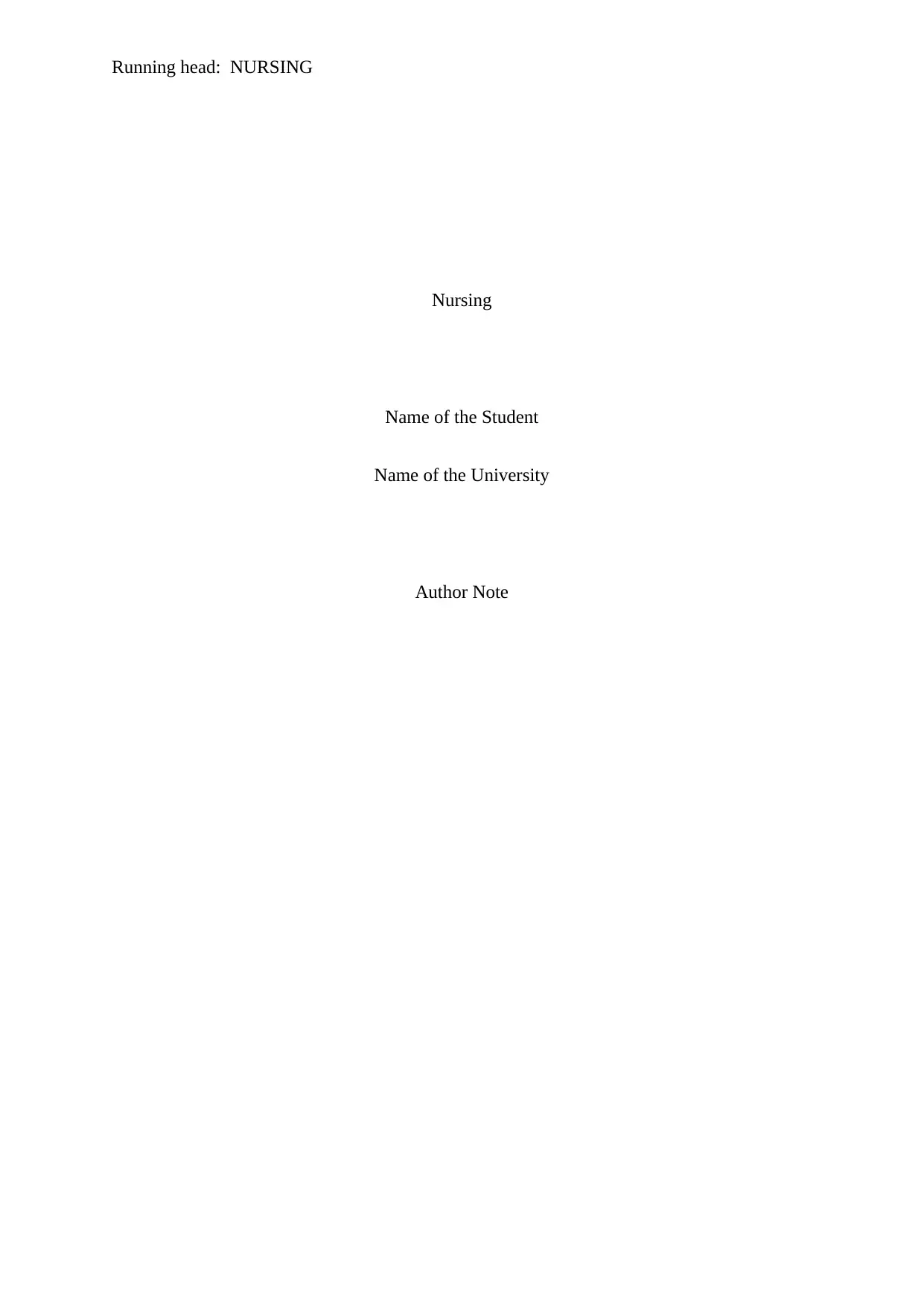
Running head: NURSING
Nursing
Name of the Student
Name of the University
Author Note
Nursing
Name of the Student
Name of the University
Author Note
Paraphrase This Document
Need a fresh take? Get an instant paraphrase of this document with our AI Paraphraser
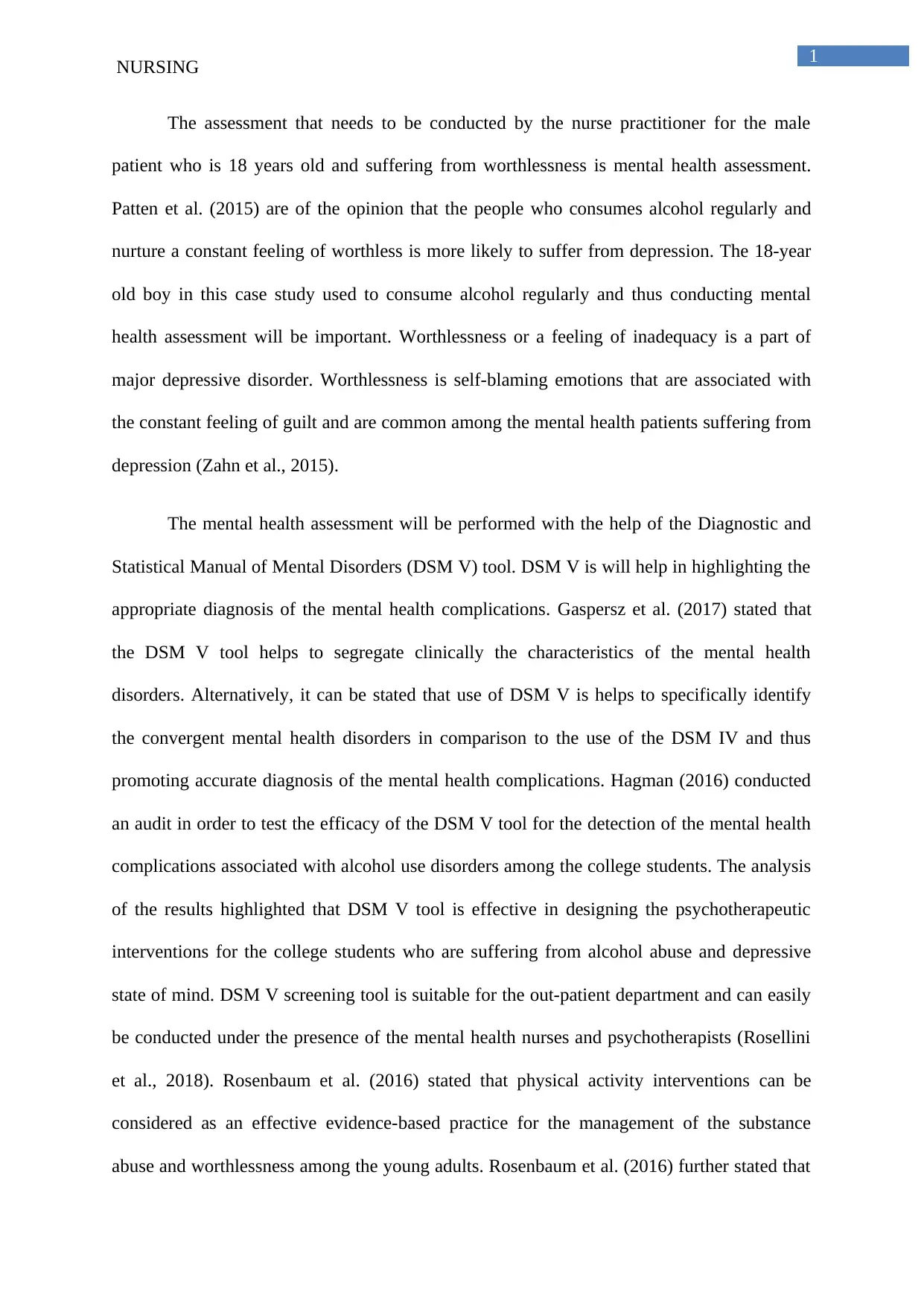
1
NURSING
The assessment that needs to be conducted by the nurse practitioner for the male
patient who is 18 years old and suffering from worthlessness is mental health assessment.
Patten et al. (2015) are of the opinion that the people who consumes alcohol regularly and
nurture a constant feeling of worthless is more likely to suffer from depression. The 18-year
old boy in this case study used to consume alcohol regularly and thus conducting mental
health assessment will be important. Worthlessness or a feeling of inadequacy is a part of
major depressive disorder. Worthlessness is self-blaming emotions that are associated with
the constant feeling of guilt and are common among the mental health patients suffering from
depression (Zahn et al., 2015).
The mental health assessment will be performed with the help of the Diagnostic and
Statistical Manual of Mental Disorders (DSM V) tool. DSM V is will help in highlighting the
appropriate diagnosis of the mental health complications. Gaspersz et al. (2017) stated that
the DSM V tool helps to segregate clinically the characteristics of the mental health
disorders. Alternatively, it can be stated that use of DSM V is helps to specifically identify
the convergent mental health disorders in comparison to the use of the DSM IV and thus
promoting accurate diagnosis of the mental health complications. Hagman (2016) conducted
an audit in order to test the efficacy of the DSM V tool for the detection of the mental health
complications associated with alcohol use disorders among the college students. The analysis
of the results highlighted that DSM V tool is effective in designing the psychotherapeutic
interventions for the college students who are suffering from alcohol abuse and depressive
state of mind. DSM V screening tool is suitable for the out-patient department and can easily
be conducted under the presence of the mental health nurses and psychotherapists (Rosellini
et al., 2018). Rosenbaum et al. (2016) stated that physical activity interventions can be
considered as an effective evidence-based practice for the management of the substance
abuse and worthlessness among the young adults. Rosenbaum et al. (2016) further stated that
NURSING
The assessment that needs to be conducted by the nurse practitioner for the male
patient who is 18 years old and suffering from worthlessness is mental health assessment.
Patten et al. (2015) are of the opinion that the people who consumes alcohol regularly and
nurture a constant feeling of worthless is more likely to suffer from depression. The 18-year
old boy in this case study used to consume alcohol regularly and thus conducting mental
health assessment will be important. Worthlessness or a feeling of inadequacy is a part of
major depressive disorder. Worthlessness is self-blaming emotions that are associated with
the constant feeling of guilt and are common among the mental health patients suffering from
depression (Zahn et al., 2015).
The mental health assessment will be performed with the help of the Diagnostic and
Statistical Manual of Mental Disorders (DSM V) tool. DSM V is will help in highlighting the
appropriate diagnosis of the mental health complications. Gaspersz et al. (2017) stated that
the DSM V tool helps to segregate clinically the characteristics of the mental health
disorders. Alternatively, it can be stated that use of DSM V is helps to specifically identify
the convergent mental health disorders in comparison to the use of the DSM IV and thus
promoting accurate diagnosis of the mental health complications. Hagman (2016) conducted
an audit in order to test the efficacy of the DSM V tool for the detection of the mental health
complications associated with alcohol use disorders among the college students. The analysis
of the results highlighted that DSM V tool is effective in designing the psychotherapeutic
interventions for the college students who are suffering from alcohol abuse and depressive
state of mind. DSM V screening tool is suitable for the out-patient department and can easily
be conducted under the presence of the mental health nurses and psychotherapists (Rosellini
et al., 2018). Rosenbaum et al. (2016) stated that physical activity interventions can be
considered as an effective evidence-based practice for the management of the substance
abuse and worthlessness among the young adults. Rosenbaum et al. (2016) further stated that
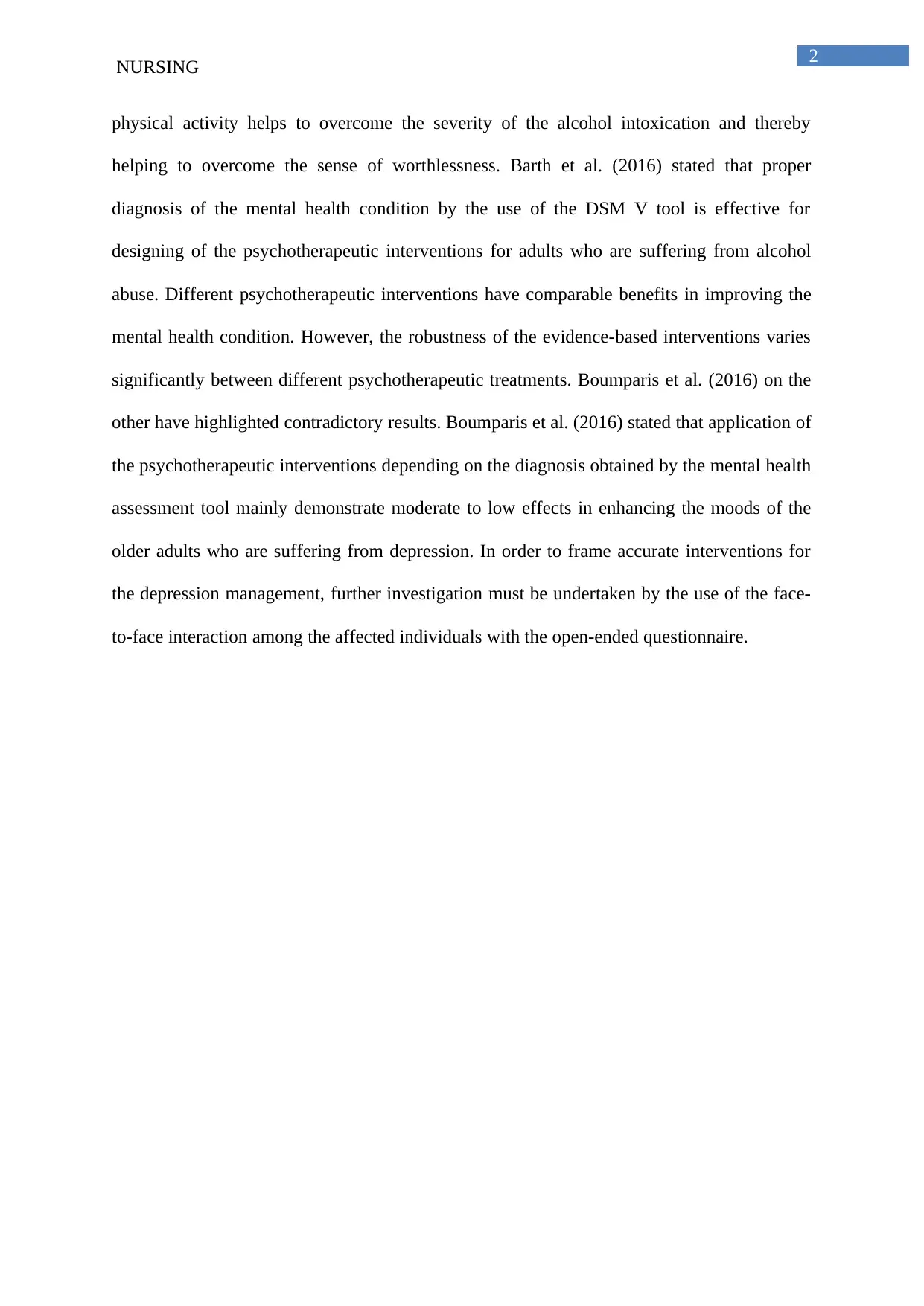
2
NURSING
physical activity helps to overcome the severity of the alcohol intoxication and thereby
helping to overcome the sense of worthlessness. Barth et al. (2016) stated that proper
diagnosis of the mental health condition by the use of the DSM V tool is effective for
designing of the psychotherapeutic interventions for adults who are suffering from alcohol
abuse. Different psychotherapeutic interventions have comparable benefits in improving the
mental health condition. However, the robustness of the evidence-based interventions varies
significantly between different psychotherapeutic treatments. Boumparis et al. (2016) on the
other have highlighted contradictory results. Boumparis et al. (2016) stated that application of
the psychotherapeutic interventions depending on the diagnosis obtained by the mental health
assessment tool mainly demonstrate moderate to low effects in enhancing the moods of the
older adults who are suffering from depression. In order to frame accurate interventions for
the depression management, further investigation must be undertaken by the use of the face-
to-face interaction among the affected individuals with the open-ended questionnaire.
NURSING
physical activity helps to overcome the severity of the alcohol intoxication and thereby
helping to overcome the sense of worthlessness. Barth et al. (2016) stated that proper
diagnosis of the mental health condition by the use of the DSM V tool is effective for
designing of the psychotherapeutic interventions for adults who are suffering from alcohol
abuse. Different psychotherapeutic interventions have comparable benefits in improving the
mental health condition. However, the robustness of the evidence-based interventions varies
significantly between different psychotherapeutic treatments. Boumparis et al. (2016) on the
other have highlighted contradictory results. Boumparis et al. (2016) stated that application of
the psychotherapeutic interventions depending on the diagnosis obtained by the mental health
assessment tool mainly demonstrate moderate to low effects in enhancing the moods of the
older adults who are suffering from depression. In order to frame accurate interventions for
the depression management, further investigation must be undertaken by the use of the face-
to-face interaction among the affected individuals with the open-ended questionnaire.
⊘ This is a preview!⊘
Do you want full access?
Subscribe today to unlock all pages.

Trusted by 1+ million students worldwide
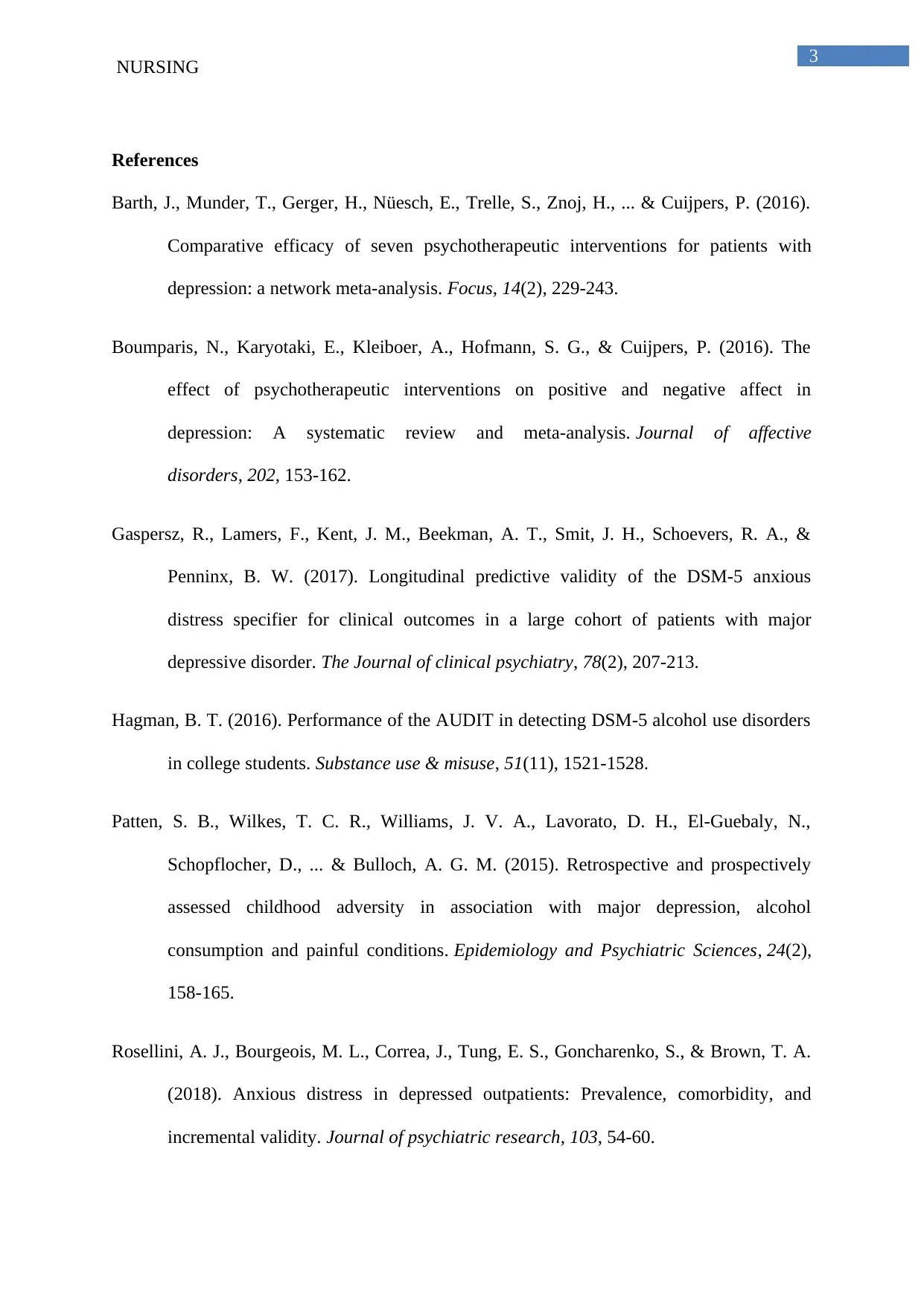
3
NURSING
References
Barth, J., Munder, T., Gerger, H., Nüesch, E., Trelle, S., Znoj, H., ... & Cuijpers, P. (2016).
Comparative efficacy of seven psychotherapeutic interventions for patients with
depression: a network meta-analysis. Focus, 14(2), 229-243.
Boumparis, N., Karyotaki, E., Kleiboer, A., Hofmann, S. G., & Cuijpers, P. (2016). The
effect of psychotherapeutic interventions on positive and negative affect in
depression: A systematic review and meta-analysis. Journal of affective
disorders, 202, 153-162.
Gaspersz, R., Lamers, F., Kent, J. M., Beekman, A. T., Smit, J. H., Schoevers, R. A., &
Penninx, B. W. (2017). Longitudinal predictive validity of the DSM-5 anxious
distress specifier for clinical outcomes in a large cohort of patients with major
depressive disorder. The Journal of clinical psychiatry, 78(2), 207-213.
Hagman, B. T. (2016). Performance of the AUDIT in detecting DSM-5 alcohol use disorders
in college students. Substance use & misuse, 51(11), 1521-1528.
Patten, S. B., Wilkes, T. C. R., Williams, J. V. A., Lavorato, D. H., El-Guebaly, N.,
Schopflocher, D., ... & Bulloch, A. G. M. (2015). Retrospective and prospectively
assessed childhood adversity in association with major depression, alcohol
consumption and painful conditions. Epidemiology and Psychiatric Sciences, 24(2),
158-165.
Rosellini, A. J., Bourgeois, M. L., Correa, J., Tung, E. S., Goncharenko, S., & Brown, T. A.
(2018). Anxious distress in depressed outpatients: Prevalence, comorbidity, and
incremental validity. Journal of psychiatric research, 103, 54-60.
NURSING
References
Barth, J., Munder, T., Gerger, H., Nüesch, E., Trelle, S., Znoj, H., ... & Cuijpers, P. (2016).
Comparative efficacy of seven psychotherapeutic interventions for patients with
depression: a network meta-analysis. Focus, 14(2), 229-243.
Boumparis, N., Karyotaki, E., Kleiboer, A., Hofmann, S. G., & Cuijpers, P. (2016). The
effect of psychotherapeutic interventions on positive and negative affect in
depression: A systematic review and meta-analysis. Journal of affective
disorders, 202, 153-162.
Gaspersz, R., Lamers, F., Kent, J. M., Beekman, A. T., Smit, J. H., Schoevers, R. A., &
Penninx, B. W. (2017). Longitudinal predictive validity of the DSM-5 anxious
distress specifier for clinical outcomes in a large cohort of patients with major
depressive disorder. The Journal of clinical psychiatry, 78(2), 207-213.
Hagman, B. T. (2016). Performance of the AUDIT in detecting DSM-5 alcohol use disorders
in college students. Substance use & misuse, 51(11), 1521-1528.
Patten, S. B., Wilkes, T. C. R., Williams, J. V. A., Lavorato, D. H., El-Guebaly, N.,
Schopflocher, D., ... & Bulloch, A. G. M. (2015). Retrospective and prospectively
assessed childhood adversity in association with major depression, alcohol
consumption and painful conditions. Epidemiology and Psychiatric Sciences, 24(2),
158-165.
Rosellini, A. J., Bourgeois, M. L., Correa, J., Tung, E. S., Goncharenko, S., & Brown, T. A.
(2018). Anxious distress in depressed outpatients: Prevalence, comorbidity, and
incremental validity. Journal of psychiatric research, 103, 54-60.
Paraphrase This Document
Need a fresh take? Get an instant paraphrase of this document with our AI Paraphraser
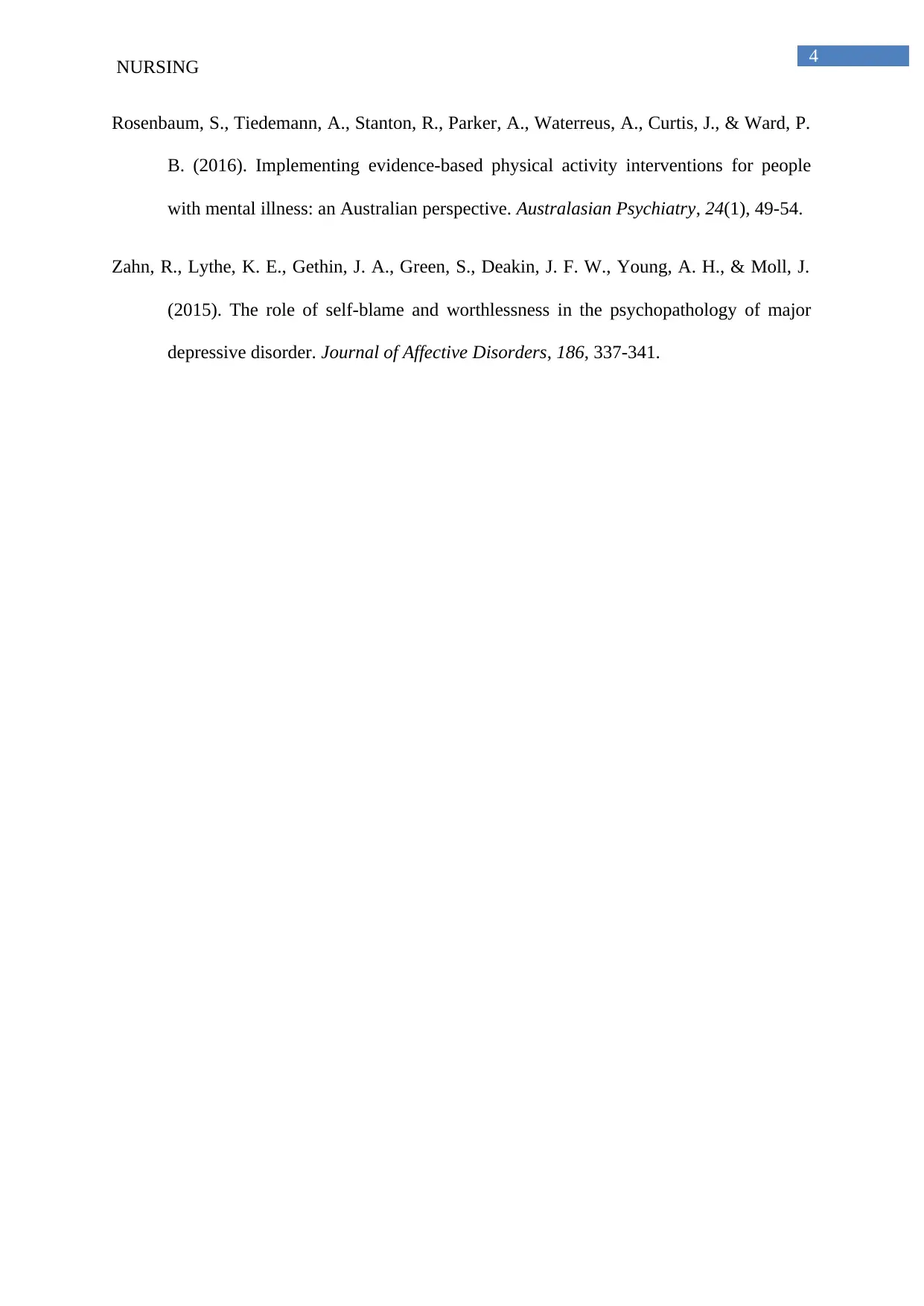
4
NURSING
Rosenbaum, S., Tiedemann, A., Stanton, R., Parker, A., Waterreus, A., Curtis, J., & Ward, P.
B. (2016). Implementing evidence-based physical activity interventions for people
with mental illness: an Australian perspective. Australasian Psychiatry, 24(1), 49-54.
Zahn, R., Lythe, K. E., Gethin, J. A., Green, S., Deakin, J. F. W., Young, A. H., & Moll, J.
(2015). The role of self-blame and worthlessness in the psychopathology of major
depressive disorder. Journal of Affective Disorders, 186, 337-341.
NURSING
Rosenbaum, S., Tiedemann, A., Stanton, R., Parker, A., Waterreus, A., Curtis, J., & Ward, P.
B. (2016). Implementing evidence-based physical activity interventions for people
with mental illness: an Australian perspective. Australasian Psychiatry, 24(1), 49-54.
Zahn, R., Lythe, K. E., Gethin, J. A., Green, S., Deakin, J. F. W., Young, A. H., & Moll, J.
(2015). The role of self-blame and worthlessness in the psychopathology of major
depressive disorder. Journal of Affective Disorders, 186, 337-341.
1 out of 5
Related Documents
Your All-in-One AI-Powered Toolkit for Academic Success.
+13062052269
info@desklib.com
Available 24*7 on WhatsApp / Email
![[object Object]](/_next/static/media/star-bottom.7253800d.svg)
Unlock your academic potential
Copyright © 2020–2026 A2Z Services. All Rights Reserved. Developed and managed by ZUCOL.





